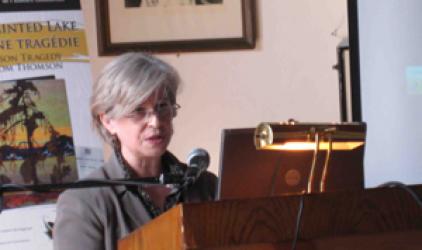Canada’s History Wars (Ruth Sandwell)

Intense debates have erupted about the nature and purpose of history and history education within a number of countries in recent years, accompanied by more and less political and social vitriol and educational change. Debates about history education, which typically manifest themselves in national and indeed nationalistic frameworks, promise to bring fresh perspectives and insights to our understanding of just what history education does, what it means and why it matters. I was, therefore, pleased to be invited by Tony Taylor (Monash University, Melbourne, Australia) and Robert Guyver (University College Plymouth, UK) to contribute the Canadian chapter to an international collection of essays that they are editing, History Wars and the Classroom: A Global Perspective. Based on interviews with a variety of professionals closely involved in history education in Canada, my chapter draws on oral history to explore the visions and goals that have informed those professionals working to change history education in Canada, as well as their evaluations of just what has been accomplished in Canada’s “History Wars.”
As the editors explained to potential contributors, the purpose of this collection is to examine a range of issues that have manifested themselves in History Wars in various countries – inclusion and identity (especially of indigenous groups as well as other ethnicities), guilt, blame, patriotic grand narratives, neoconservatism, etc. – and explore their relation to the history curriculum. “The idea is to look not only at ‘wars’ (as in ‘debates’), but also the outcomes or solutions (even compromises) that followed (and the rationales behind them), with sections on political, ideological, pedagogical and even historiographical factors that have influenced developments.” Essays about Britain, the United States, Germany, Japan, Australia, New Zealand, Argentina, South Africa, and Russia will be included, along with Canada.
 Rather than attempt to provide a scholarly description and analysis of Canadian History Wars (Penney Clark has recently done a fine job of this in her introduction to a forthcoming collection of essays about Canadian history education, New Possibilities for the Past: Shaping History Education in Canada), I proposed to the editors that my chapter instead be based on a series of interviews with a variety of Canadian history educators, historians, history teachers and public historians who have been closely involved with Canada’s History Wars over the past twenty years. Drawing on interviews conducted in the summer of 2010 with fourteen professionals who were participants in and close observers of the Canadian debates, the chapter explores their reflections on their role in these discussions and also their impressions of the larger debates about history education in Canada that have informed their work – what were the nature, the purpose, and outcome of recent discussions on the subject? The chapter also includes comments and reflections of two anonymous reviewers. All but one voice – my own – remain anonymous.
Rather than attempt to provide a scholarly description and analysis of Canadian History Wars (Penney Clark has recently done a fine job of this in her introduction to a forthcoming collection of essays about Canadian history education, New Possibilities for the Past: Shaping History Education in Canada), I proposed to the editors that my chapter instead be based on a series of interviews with a variety of Canadian history educators, historians, history teachers and public historians who have been closely involved with Canada’s History Wars over the past twenty years. Drawing on interviews conducted in the summer of 2010 with fourteen professionals who were participants in and close observers of the Canadian debates, the chapter explores their reflections on their role in these discussions and also their impressions of the larger debates about history education in Canada that have informed their work – what were the nature, the purpose, and outcome of recent discussions on the subject? The chapter also includes comments and reflections of two anonymous reviewers. All but one voice – my own – remain anonymous.
“‘We were allowed to disagree, because we couldn’t agree on anything’: Seventeen Voices in the Canadian Debates Over History Education,” in Tony Taylor and Robert Guyver, eds., History Wars and the Classroom: a Global Perspective (Information Age, 2011).
- Se connecter ou créer un compte pour soumettre des commentaires
- Français

